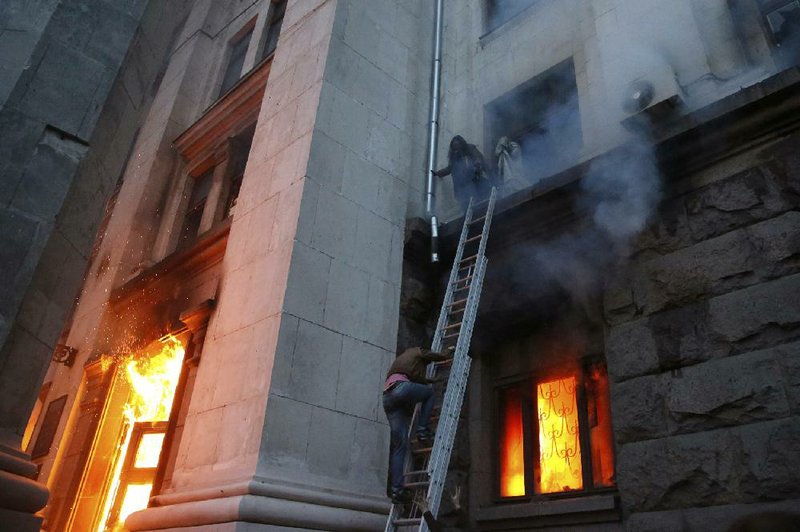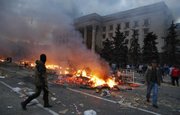SLOVYANSK, Ukraine - Ukraine launched an offensive against separatist forces for control of a besieged eastern city Friday, and clashes between pro- and anti-government activists in the previously calm southern port of Odessa led to a fire that police said killed 31 people.
The first serious offensive by the government and the dozens of deaths in Odessa sharply escalated the crisis that has led to the worst tensions between Russia and the West since the Cold War. The Kremlin said the battle for the separatist-held Slovyansk effectively destroyed the Geneva pact aimed at cooling the unrest in the country.
Oleksandr Turchynov, Ukraine’s acting president, said many insurgents were killed or wounded in the eastern offensive, which took place two days after Kiev said it had lost control of eastern Ukraine.
Both sides said two Ukrainian helicopters were shot down by the insurgents near Slovyansk, killing two crew members, while authorities said another seven people died: three separatist gunmen, two soldiers and two civilians.
By nightfall, Ukrainian troops and armored personnel carriers blocked all major roads into Slovyansk, and the central part of the city remained in the hands of pro-Russia gunmen, according to Associated Press journalists inside. Most shops were closed, and the few that were open were crowded with customers stocking up on supplies.
Sporadic gunfire was heard in Slovyansk’s downtown late Friday, while Russian news reports said there were armed clashes in the nearby town of Kramatorsk. There was no immediate independent confirmation of fighting.
The Ukrainian Security Service said one helicopter was downed with a surface to-air missile, adding that the sophisticated weapon undercut Russia’s claims that the city of 125,000 people was simply under the control of armed locals.
Russia has massed tens of thousands of troops in areas near Ukraine’s border. Kiev claims that Moscow is preparing to invade and that it is fomenting the unrest in the east, where insurgents have seized government buildings in cities and towns. The Kremlin denies the allegations, but Foreign Minister Sergey Lavrov has warned that Russia would respond to attacks on its citizens or interests in the east.
Unlike eastern Ukraine, Odessa had been largely tranquil since the February toppling of President Viktor Yanukovych, who fled to Russia. But clashes broke out Friday between pro-Russia activists and government supporters in the key port on the Black Sea coast, 330 miles from the turmoil in the east.
Police said the deadly fire broke out in a trade-union building but did not give details on how it started. Earlier, police said at least three people had died in a clash between the two sides in the city of 1 million.
According to Ukrainian news reports, the pro-Kiev demonstrators broke up an encampment of Moscow supporters outside the trade-union building. The latter took refuge in the building, which then caught fire.
Odessa police spokesman Volodymyr Shasbliyenko said the fire apparently was caused by Molotov cocktails. He had no further details or identities of the victims.
Russia’s Foreign Ministry said the fire was “yet another manifestation of the criminal irresponsibility of the Kiev authorities who indulge insolent radical nationalists … which are engaging in a campaign of physical terror” against those in Ukraine who want more autonomy for the pro-Moscow regions.
A spokesman for Russian President Vladimir Putin said the Ukrainian offensive “effectively destroyed the last hope for the implementation of the Geneva agreement” of two weeks ago that aimed to defuse the crisis. But Dmitry Peskov also said Russia “continues to undertake consistent efforts on de-escalation.”
At Russia’s request, the U.N. Security Council met in an emergency session Friday to discuss Ukraine.
The United Nations council for the 13th time failed to take action on the growing crisis in Ukraine, with Russian ambassador Vitaly Churkin demanding a “swift halt of all violence” and Western powers scoffing at his country’s indignation.
Council members accused Russia of equipping and funding the pro-Russia forces that have seized government buildings in at least 10 eastern cities.
“Russia … has released bands of thugs on Ukraine … and is suddenly discovering this mixture might escape its control,” French ambassador Gerard Araud said.
The council so far has been unable to agree on any action on Ukraine, as Russia holds veto power as a permanent council member. The 193-nation General Assembly weeks ago affirmed Ukraine’s territorial integrity in a surprisingly strong but nonbinding vote, showing Russia’s isolated stance.
In Washington, German Chancellor Angela Merkel and U.S. President Barack Obama warned that Russia could be hit by new sanctions from the U.S. and the European Union ifit continues disruptive actions in Ukraine. Previous sanctions are showing signs of an effect on the Russian economy.
Obama said the U.S. and Europe have shown “remarkable unity” in their response so far, though he acknowledged that some European countries are vulnerable to Russian retaliation for sanctions and said those concerns must be taken into account.
“The next step is going to be a broader-based sectoral sanctions regime,” Obama said, referring to entire segments of Russia’s economy, such as energy or arms.
“If in fact we see the disruptions and the destabilization continuing so severely that it impedes elections on May 25,we will not have a choice but to move forward with additional, more severe sanctions,” the president said.
Kiev’s interim government rose to power after Yanukovych fled, drummed out by months of anti-government protests. Ukraine plans to hold a new presidential election May 25.
Meanwhile, Defense Secretary Chuck Hagel said Friday that NATO should reconsider its relationship with Russia in light of its incursion into Ukraine, which should bury the idea that the end of the Cold War brought permanent peace to Europe.
“Russia’s actions in Ukraine shatter that myth and usher in bracing new realities,” Hagel said.
JOURNALISTS DETAINED
The fighting in Slovyansk, a city about 100 miles from the Russian border, broke out around dawn. Stella Khorosheva, a spokesman for the insurgents, said three fighters and two civilians were killed in the clashes.
The Russian state television channel Rossiya-24 showed one man who they said was a wounded helicopter pilot surrounded by pro-Russia forces.
Several foreign news crews, meanwhile, were detained for several hours Friday by pro-Russia militia members before being released. CBS reported that one journalist was beaten.
The pro-Russia activists also are holding captive a German-led team of military observers affiliated with the Organization for Security and Cooperation in Europe.
Slovyansk is strategically key because Ukraine has a huge stockpile of automatic rifles and other light weapons near the city, according to a commentary Friday for Britain’s Royal United Services Institute defense think-tank.
“Today, Kiev has upped the ante in the standoff and will test Russian resolve to prevent the Ukrainian government from regaining control of the city and its light weapons stockpile,” the authors wrote.
Turchynov said some government troops and police in eastern Ukraine were “either helping or cooperating with terrorist organizations.” He said Ukrainian forces were working to prevent the unrest from spreading to other areas.
Ukraine, a nation of 46 million, is torn between those in the west who favor closer ties with Europe and many Russian-speakers in the east who look toward Moscow. Separatists have seized government buildings in the eastern cities amid fears that Moscow is seeking a pretext to invade or annex more territory like it did with Ukraine’s Black Sea peninsula of Crimea in March.
The peace deal in Geneva last month aimed to get those who had seized government buildings in Ukraine to leave and calm down the tensions.
The Russian Foreign Ministry accused Ukraine’s government of using “terrorists” from ultra nationalist organizations for Friday’s military operation. It also claimed that Kiev deployed tanks and helicopters that were “conducting missile strikes on protesters,” something neither side in Ukraine reported.
Russia also cited insurgents in Ukraine as saying that some of the attackers spoke English - an insinuation that the Ukrainian military was getting help from the West.
Meanwhile, TV crews from Sky News and CBS were detained Friday on the outskirts of Slovyansk. Sky News said in a statement that its crew was detained for several hours but is now “safe and well.”
CBS correspondent Clarissa Ward told CBS This Morning that she and her crew were stopped by pro-Russia insurgents at a checkpoint just outside Slovyansk, then taken to a nearby town where they were blindfolded tightly with masking tape. They were released several hours later, unharmed except for one man who was beaten.
Friday’s detentions came three days after the Committee to Protect Journalists expressed alarm at how reporters and media organizations were being targeted in Ukraine.
Information for this article was contributed by Jim Heintz, Peter Leonard, Nataliya Vasilyeva, Maria Danilova, Cara Anna, David Bauder, Josh Lederman, Gier Moulson, Steven R. Hurst and Robert Burns of The Associated Press and by C.J. Chivers, Noah Sneider, Neil MacFarquhar, Andrew E. Kramer, Alan Cowell and Alison Smale of The New York Times.
Front Section, Pages 1 on 05/03/2014


